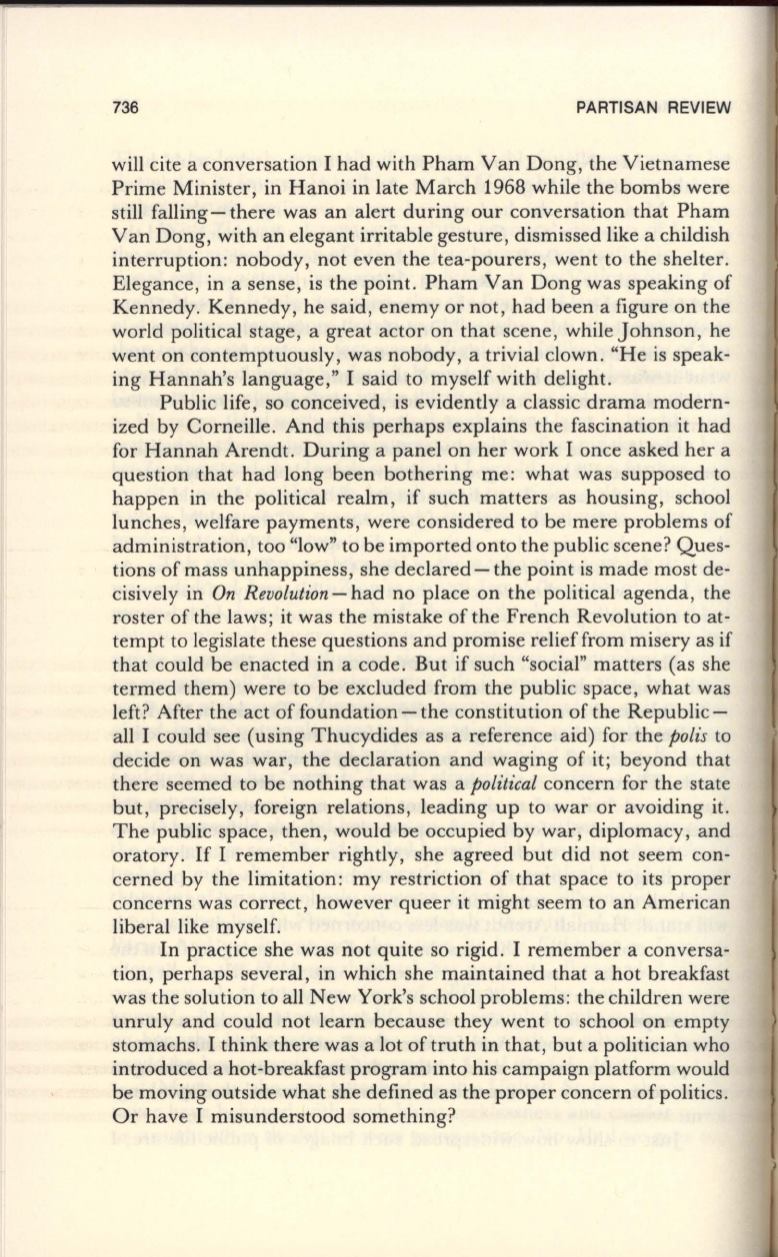
736
PARTISAN REVIEW
will cite a conversation I had with Pham Van Dong, the Vietnamese
Prime Minister, in Hanoi in late March 1968 while the bombs were
still falling- there was an alert during our conversation that Pham
Van Dong, with an elegant irritable gesture, dismissed like a childish
interruption: nobody, not even the tea-pourers, went to the shelter.
Elegance, in a sense, is the point . Pham Van Dong was speaking of
Kennedy. Kennedy , he said, enemy or not, had been a figure on the
world political stage, a great actor on that scene, while johnson, he
went on contemptuously, was nobody, a trivial clown. "He is speak–
ing Hannah's language," I said to myself with delight.
Public life, so conceived, is evidently a classic drama modern–
ized by Corneille. And this perhaps explains the fascination it had
for Hannah Arendt. During a panel on her work I once asked her a
question that had long been bothering me: what was supposed to
happen in the political realm, if such matters as housing, school
lunches, welfare payments, were considered to be mere problems of
administration, too "low" to be imported onto the public scene? Ques–
tions of mass unhappiness, she declared- the point is made most de–
cisively in
On Revolution-
had no place on the political agenda , the
roster of the laws; it was the mistake of the French Revolution to at–
tempt to legislate these questions and promise relief from misery as if
that could be enacted in a code. But if such "social" matters (as she
termed them) were to be excluded from the public space, what was
left? After the act offoundation-the constitution of the Republic–
all I could see (using Thucydides as a reference aid) for the
polis
to
decide on was war, the declaration and waging of it; beyond that
there seemed to be nothing that was a
political
concern for the state
but, precisely, foreign relations, leading up to war or avoiding it.
The public space, then, would be occupied by war, diplomacy, and
oratory .
If
I remember rightly, she agreed but did not seem con–
cerned by the limitation: my restriction of that space to its proper
concerns was correct, however queer it might seem to an American
liberal like myself.
In practice she was not quite so rigid. I remember a conversa–
tion, perhaps several, in which she maintained that a hot breakfast
was the solution to all New York's school problems : the children were
unruly and could not learn because they went to school on empty
stomachs. I think there was a lot of truth in that, but a politician who
introduced a hot-breakfast program into his campaign platform would
be moving outside what she defined as the proper concern of politics.
Or have I misunderstood something?


